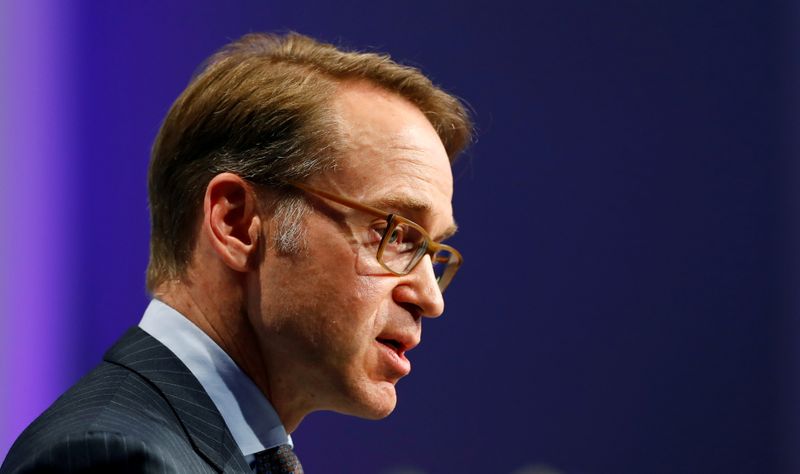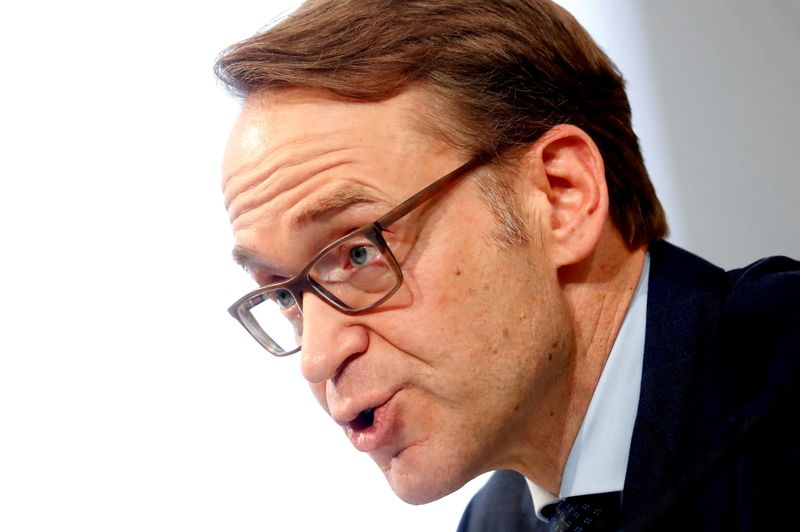By Balazs Koranyi and Francesco Canepa
FRANKFURT (Reuters) -Bundesbank President Jens Weidmann, a relentless critic of the European Central Bank's ultra easy monetary policy, will step down more than five years early, opening the door for Germany's new government to pick a less confrontational successor.
Weidmann said he would leave for personal reasons on Dec. 31, just days after the ECB is set to make a crucial decision on winding down pandemic-era stimulus that has revived growth but also pushed inflation to its highest rate in over a decade.
Among the most conservative members of the ECB's Governing Council, Weidmann often found himself in opposition https://www.reuters.com/business/weidmann-often-lonely-ecb-voice-against-easy-money-2021-10-20 to fellow policymakers, even challenging the ECB policy tool designed to back then-president Mario Draghi's 2012 pledge to do "whatever it takes" to save the euro.
Even as he announced his departure, the third successive Bundesbank president to quit early, Weidmann warned about inflation risks. "It will be crucial not to look one-sidedly at deflationary risks, but not to lose sight of prospective inflationary dangers either," he said in a message to staff.
The successor to Weidmann, a former economic advisor to Chancellor Angela Merkel, will be picked by the new German government, likely to be a left-leaning coalition led by current finance minister Olaf Scholz.
The change in government may also mean easier fiscal policy in the coming years, suggesting that the fiscally conservative Weidmann could also find himself in more frequent opposition to his own government.
Highlighting the personal nature of Weidmann's resignation, he informed ECB President Christine Lagarde and Scholz only on Wednesday morning, shortly before the public announcement.
ECB-watchers said potential Bundesbank chiefs include Claudia Buch, now Weidmann's deputy, economists Volker Wieland, Marcel Fratzscher, Lars Feld, Lars-Hendrik Röller and Jakob von Weizsäcker, and current Bundesbank chief economist Jens Ulbrich.
Isabel Schnabel, an ECB board member, is also a potential successor, although she would need to quit her current role, which some argue is a higher-profile job.
None of the euro zone's 19 national central banks is led by a woman and Scholz's SPD and the Greens, both likely to be part of the next ruling coalition, have advocated improved gender balance in government.
"Isabel Schnabel is doing a fabulous job at the ECB but I could think of no one better than Schnabel to lead the Bundesbank at this juncture," UniCredit economist Erik Nielsen said. "Perfect background and experience, and outstanding European and global respect."
CONFLICT
After taking charge at the Bundesbank in May 2011 as the euro zone's debt crisis raged, Weidmann was frequently in a minority at the ECB, voting against major policy moves pushed through by ECB chiefs Mario Draghi and Lagarde.
In July, the 53-year-old was among a handful of policymakers that opposed the ECB's pledge to keep interest rates at record lows until inflation stabilises at 2%.
"I respect Jens Weidmann's decision to step down from his position as President of Deutsche Bundesbank at the end of this year after more than 10 years of service, but I also immensely regret it," ECB President Lagarde said on Wednesday.
The ECB, the central bank for the 19 countries that use the euro currency, has battled with sluggish price growth for a decade, but inflation has risen sharply in recent months and data on Wednesday showed it hit 3.4% in September.
While he has become less combative in recent years, Weidmann's criticisms made it difficult for the ECB to prop up public confidence in its policies and close a wide "trust gap" that opened up after the global financial crisis from 2007.
One issue on which he has recently softened his tone is the notion of the ECB taking on a greater role in the fight against climate change via its asset purchases, championed by Lagarde.

"The change will not cause a dramatic policy shift as the Bundesbank is only one voice in the ECB Governing Council, where monetary policy is determined," Andrew Kenningham at Capital Economics said.
"But the new President is likely to be more supportive of the generally dovish and 'green' direction in which Christine Lagarde is leading the ECB."
